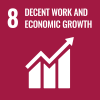Pacaraima, Brazil – At sunrise, the bakery’s door swings open, revealing an assortment of mouthwatering delights. The display case draws in locals who bustle about, leaving with bags of flavourful treasures. Nestled on a street corner in Pacaraima, a Brazilian town bordering Venezuela, it exudes the charm of a town committed to the motto, "Good Bread". With this promise proudly etched on its walls, the stage is set for a day filled with culinary delights.
Dora and Rene alternate between greeting customers at the counter and crafting fresh batches of bread in their kitchen. This familiar routine has been their life for the past five years, ever since they made the difficult decision to leave Venezuela with their children and a few precious belongings, family pets, and equipment from their previous business in a small trailer, embarking on a journey that would lead them to a new country and a fresh start.

Rene and Dora left Venezuela five years ago and settled in Pacaraima, a neighbouring town to their home country, establishing the “good bread” bakery. Photo: IOM/Bruno Mancinelli
Their arrival in Brazil in 2018 is a poignant milestone that still resonates emotionally. Navigating unfamiliar customs and culture, they embarked on a gradual process of building a new home in an unfamiliar place, working hard to convert their small living space into a bakery and a source of income.
"We are doing well here. Migrating was not easy, but I would tell Dora five years ago that she made the right decision. If we ever returned to Venezuela, I would always speak highly of Brazil because the people are very kind and have always treated us with respect," says Rene.

In Brazil, one of the new challenges for the couple was to understand the Portuguese language for customer service. Photo: IOM/Bruno Mancinelli
As time unfolded, the couple integrated into the community, cultivating new friendships. Their Venezuelan bread, heralded for its quality, quickly gained acclaim through word-of-mouth recommendations and the patronage of early customers, solidifying its status as one of the best in town. This success facilitates the acquisition of their current space for the bakery, named Virgen Maria del Vale.
"The Venezuelan product stands out significantly from its Brazilian counterpart, yet our commitment to baking drove our success. We started with our familiar thick-crusted bread, reminiscent of what we crafted in Venezuela. Surprisingly, the locals embraced it," Rene recalls when discussing pão de sal, a popular bread roll in South America.

Dora prepares the service counter with savory snacks to suit the tastes of both Brazilian and Venezuelan customers in the town. Photo: IOM/Bruno Mancinelli
With rising sales, the bakery expanded its offerings, incorporating Rene's mother's cherished recipes, including their homeland’s famed coconut bread. Quickly gaining popularity, this traditional delicacy became a coveted item at the bakery.
Responding to local preferences, the couple adapted to local taste, notably for pão de queijo (cheese bread), a term initially unfamiliar to them. Through experimentation, Rene crafted his unique version of cheese bread, a distinct yet delightful take on the traditional recipe. The menu also welcomed thin-crusted bread, boasting a soft texture and a golden butter crust akin to hot dog buns.

Venezuelan delicacies have been added to the menu and have become a success with the residents, becoming a landmark in Pacaraima. Photo: IOM/Bruno Mancinelli
Each addition reflects the couple’s commitment to satisfying diverse tastes and creating a truly exceptional bakery experience.
"It was a whole process for us to get to know each other and understand Brazilian customs. It wasn't easy, but we overcame it," Dora says. "The bread dough is prepared the night before, and we begin baking as early as 4:00 in the morning so that we can open the bakery at 6:30 and serve freshly baked bread. By that time, we already have customers waiting."
The family’s newfound link with the local community is clear in their future plans: to stay in the border town of Pacaraima and support business expansion, which is already taking shape with the rental of a second facility for snack sales.

The bread preparation takes place every day, with the dough resting overnight to be sold in the morning still warm for the customers. Photo: IOM/Bruno Mancinelli
As the aroma of their success lingers in the air, Dora’s and Rene's journey stands testament to the power of resilience, passion and shared dreams. Through warm loaves and genuine smiles, they have created a culinary experience that crosses borders and brings communities together, embodying the spirit of unity and the universal language of food. The flavours of Venezuelan warmth have found a place in the hearts of the Brazilian community.

For the future, the couple hopes that the success of the business continues, and yields results for the expansion of the bakery. Photo: IOM/Bruno Mancinelli
Written by Ana Paula Lima, Project Assistant, IOM Brazil.

